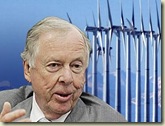 The reason to pay attention to T. Boone Pickens and his plan to replace natural gas with wind energy so as to divert the natural gas to automobiles is two-fold: he’s really rich and has the funds to build a constituency for his ideas; and he aims to cut through a perceived government blockage on energy policy by insisting on an approach – his own - that can be implemented now and has – he says - many positive qualities. He means to short-circuit the larger arguments around energy, cut through competing policy proposals, and get the American people behind a plan that is concrete and reasoned – and his.
The reason to pay attention to T. Boone Pickens and his plan to replace natural gas with wind energy so as to divert the natural gas to automobiles is two-fold: he’s really rich and has the funds to build a constituency for his ideas; and he aims to cut through a perceived government blockage on energy policy by insisting on an approach – his own - that can be implemented now and has – he says - many positive qualities. He means to short-circuit the larger arguments around energy, cut through competing policy proposals, and get the American people behind a plan that is concrete and reasoned – and his.
Put that way, Pickens might seem profoundly undemocratic, depending as he does on droit de seigneur to push to the head of the line while opposition crumbles due to the logic and fineness of his ideas. He still has to get people to buy in to his plan – without actually buying them off, which would be problematic - and government has to cede its role in policy formation to him. Many big ideas by well-meaning rich folk founder on these points – all the king’s men couldn’t put Ross Perot back together once his public image began to curdle. Commercial buys (and charts) can carry you only so far.
But should T. Boone Pickens and his plan be considered differently than, say, Al Gore and his plan? Before we offer our own answer, consider: both men use much the same apocalyptic-prophetic rhetoric in insisting on dire consequences if their warnings are not heeded. Both use media to put across their message – Gore through a slide show and movie and Pickens through TV ads and a web site. Both offer public policy prescriptions, though Pickens’ are considerably more detailed.
However, we would say there is a signal difference and, in our view, it favors Gore. Let’s leave aside that Gore opened the door that Pickens has walked through, because Gore opened that door intentionally. Anyone can, and many have, responded to Gore’s invitation to weigh in on global warming solutions. The difference really lie in the two men’s orientation.
Gore is a public servant who has continued in that role beyond holding office. We may assume he maintains many contacts in government, but publicly, he puts his ideas into the public sphere to be approached, attacked, morphed, adopted, rejected – whatever. That’s how public policy forms and how a consensus develops around policy. While he remains an effective advocate for his ideas – and the Nobel Prize conferred tremendous credibility upon his efforts – he doesn’t control them.
Pickens is a businessman. We must start with the premise that he is utterly sincere in what he wants to do – and yes, we’ve read some of the same things you may have that would upset that premise – and that he wants to make money from his efforts. Like, say, Bill Gates, who pours money and time into many worthy efforts while making sure the digital world he can influence thinks the apple is only a fruit that keeps the doctor away, Pickens inclines to worthy solutions that can materially reward him. Now, Pickens can be both a saint and a businessman – that isn’t the point – it is that he has constructed a plan that bypasses public debate and is presented as a fait accompli avant le lettre. Questions of motivation naturally rise to the fore and must be considered even if ultimately dismissed.
We can look at plans informed by Gore’s ideas - or we can look at Pickens’ plan. We can approve or disapprove it but there it is. And that’s all there is.
All this preamble is not to preclude delving into Pickens’ proposal – which we intend to do over a few posts – or to say Pickens has no right to do what he is doing – he most certainly does – but only to balance the worthy aspects of his proposal with the preemption of policy formation it represents.
---
You may well be thinking – hey, wait a second, this isn’t about using atoms for the general good. But let’s be clear, our own motivations being reasonably suspect, we don’t intend to crush Pickens and his plan under our nuclear heel.
We all recognize, I think, that any sensible energy policy has to include a mix of energy generators – practically, politically, and industrially - and wind has enough, er, wind behind it to be a part of that mix. Pickens or no Pickens, wind energy remains a cousin of nuclear energy in the non-emissions sweepstakes, and even if Pickens cannot ultimately implement his plan, its elements may well enter the broader energy discussion. So it deserves a hearing. After all, you drop in on your cousins occasionally, don’t you?
Picture of himself, T. Boone Pickens. Since there are no links, we guess this qualifies as an original piece – but please, explore the Pickens web site and see what you think.
0 comments:
Post a Comment